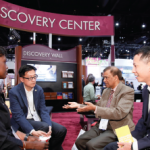Rapid, accurate and convenient point-of-care lab testing for patients is one of the promises of 21st century medicine. However, reimbursement cuts enacted through the Protecting Access to Medicare Act of 2014 (PAMA) threaten access to this testing, explains Colin Edgerton, MD, FACP, RhMSUS, partner in Articularis Healthcare and chair of the ACR’s Committee on Rheumatologic…
Search results for: rural

ACR/ARHP Advocacy Leaders Lobby U.S. Congress
On May 16 and 17, ACR/ARHP leaders serving on the Board of Directors, Affiliate Society Council, Government Affairs Committee, Committee on Rheumatologic Care, RheumPAC Committee and Insurance Subcommittee once again went to Capitol Hill to advocate on behalf of ACR/ARHP members and their patients. The group represented 27 states and the District of Columbia, and…

ACR Praises Congress for Bill with Part B Fix, Therapy Caps Repeal
The ACR praises Congressional leaders for passing the sweeping spending agreement, which includes a technical provision reversing a Centers for Medicare & Medicaid Services (CMS) policy that would have linked physicians’ quality payment adjustments to Medicare Part B drug costs starting in 2019. The ACR also applauds the inclusion of provisions that permanently repeal Medicare…

The ACR’s COIN Department Connects Providers with Communities
Last month I expressed my thoughts on the valuable and varied opportunities the ACR offers for professional and personal growth. Such engagement not only provides an opportunity to connect with your rheumatology colleagues, but also to have a positive impact on patients, supporters and all consumers of healthcare. ACR and ARHP members from every aspect…
At the Table: ACR Meets with MedPAC
The Medicare Payment Advisory Commission (MedPAC) makes recommendations to Congress on Medicare policy including physician payments and patient access issues. These recommendations can directly impact rheumatology care coverage and rheumatologist reimbursement. Representatives of the ACR and partners recently met with new MedPAC Executive Director James E. Mathews, PhD, to discuss appropriate recognition of rheumatology care…

Telehealth Is Helping the Underserved
For many uninsured and underinsured patients in Yuba City, Calif., seeing a rheumatologist used to mean taking a day off from work and driving 108 miles, roundtrip, to the University of California Davis Medical Center. That changed this year when patients were offered the option of having a telemedicine consultation with a rheumatologist as part…
ACR Leads Coalition Response to HHS Proposed Drug Pricing Threats
Potential federal drug pricing proposals could shuffle Part B drug coverage into the Part D program and restructure reimbursements for new drugs, moves that would jeopardize patient access to care, explains Kent “Kwas” Huston, MD, a rheumatologist in Kansas City, Mo., and a member of the ACR’s Government Affairs Committee (GAC). “We believe Part D…
Arkansas PBM Bill: A Step in the Right Direction
During a three-day special legislative session in March, Arkansas Governor Asa Hutchinson (R) signed into law the first bill in the U.S. intended to address a lack of transparency among pharmacy benefit managers (PBMs) and their role in the high cost of prescription drugs.1 The bill, H.B. 1010: Arkansas Pharmacy Benefits Manager Licensure Act, will…
Supply & Demand: Where Will the Rheumatology Workforce Be in 2030?
According to the “2015 American College of Rheumatology Workforce Study: Supply and Demand Projections of Adult Rheumatology Workforce, 2015–2030,” the demand for rheumatologic care is projected to exceed supply of clinical adult rheumatology providers by 4,133 clinical FTEs by 2030. The research now being published estimates the baseline adult rheumatology workforce, as well as determined demographic and geographic factors relevant to the workforce. The research also highlights the need for innovative regional strategies to manage future access to and reduce barriers to care for rheumatology patients in underserved regions…

Rheumatologist Fellow Works in India Via ACR Exchange Program
In November 2017, I went to Lucknow, India, where I would spend my time as an exchange fellow at the Sanjay Gandhi Postgraduate Institute of Medical Sciences (SGPIMS) as part of the ACR International Visiting Fellows Exchange Program. Where I Come From I completed my medical degree at Mahatma Gandhi Missions Medical College, Navi Mumbai…
- « Previous Page
- 1
- …
- 17
- 18
- 19
- 20
- 21
- …
- 31
- Next Page »